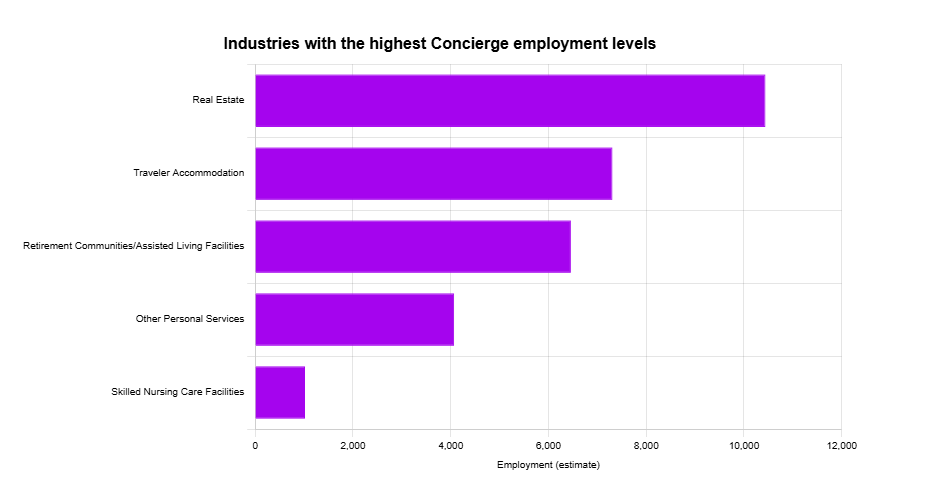Working as a Concierge: What You Need To Know
There are currently more than 40,000 Concierges working in the United States across various industries.
Projections for this position show that the number of Concierges in the United States will increase by 19.9% between 2020 and 2030.
With such an increase in Concierge employment, you might want to learn more about what this role entails. That is why we created this guide: to help you fully understand the Concierge role, what they do and how you can start.
Keep reading to find out more.
What Is a Concierge?
A Concierge is an individual who welcomes guests in a particular setting.
Concierges in the hospitality industry are commonly employed in hotels, where they greet guests and provide personalized recommendations to enhance each guest’s stay.
In a sense, they have a similar role to Receptionists, although Concierges usually have more duties and must have better knowledge of local events and attractions.
What Does a Concierge Do?
Concierges have a dynamic role and day-to-day activities.
It is their duty to ensure that guests and visitors of the establishment where they work have a pleasant stay.
As such, some of the most common Concierge duties include:
- Assisting guests, visitors and patrons of a hotel or a particular establishment
- Taking or receiving messages for guests or patrons
- Organize transportation for guests to specific locations according to the guests’ preferences
- Handle guest requests and provide personalized recommendations to ensure patron satisfaction
Top 5 Skills of Successful Concierges
Concierges who wish to succeed in their role must combine multiple soft skills with knowledge of the local area. This combination will allow them to make personalized recommendations in a friendly and efficient way.

Some of the top skills necessary for all Concierges include:
1. Communication
Concierges must have excellent communication skills to positively interact with guests and visitors.
2. Problem-solving
Concierges must often tackle the requests of visitors and patrons, sometimes having to address more difficult requests and inquiries. Successful Concierges will find a way to address all requests or provide alternative solutions to guests’ needs.
3. Attention to detail
Concierges must have excellent attention to detail. It helps them manage reservations, book appointments and keep track of schedules.
Hotel Concierges should also be able to pay attention to guests’ preferences to successfully make personalized recommendations.
4. Organization
Concierges often must tackle multiple guest requests at once. Remaining highly organized is essential to ensure efficient prioritization of tasks and to make sure that all guests receive prompt care.
5. Knowledge of local events and attractions
Concierges must constantly be updated on local events and attractions to make personalized recommendations to guests and patrons.
How To Start a Concierge Career
Becoming a Concierge offers a rewarding opportunity to provide exceptional service and assist clients with their various needs.
This role is often sought by individuals with experience in customer service or hospitality roles. This includes former Hotel Receptionists or Guest Services Agents who have experience interacting with guests and providing assistance.
Concierge is typically an entry-level position, meaning that there aren’t too many education and experience requirements necessary for this role.
To start your journey in this field, consider the following steps:
High school diploma or equivalent
A high school diploma or GED is usually the minimum education requirement for Concierges. That said, applicants who have further education or additional certifications will have a competitive edge over the competition.
Customer-oriented work experience
Individuals who have previous experience in a customer-oriented role can greatly improve their chances of becoming Concierges. Employers usually look for someone who has one to two years in a similar role.
Examples of similar roles are Hotel Receptionist, Tour Guide and Event Coordinator.
Certifications
Individuals who wish to demonstrate their dedication to succeeding in the Concierge role can acquire certifications that prove their skills. Some of the courses to consider are:
| Organization | Certification | Description |
| American Hotel and Lodging Association (AHLA) | Certified Hotel Administrator (CHA) | A virtual workshop that provides leadership and operational skills. It covers financial management, food and beverage management, leadership, rooms management and more. |
| International Air Transport Association (IATA) | Travel and Tourism Professional (TTP) | This course will equip you with practical, relevant knowledge and skills highly valued by employers in the tourism and hospitality industry. |
| National Concierge Association (NCA) | NCA Certified Concierge | To be certified you must become a member of the NCA, complete the NCA Orientation session and all requirements of the NCA Certification program. |
Can I Become a Concierge Even Without Experience?
Yes, you can become a Concierge without having prior experience.
The specific requirements for the Concierge role vary from employer to employer. While some Concierge positions might require certifications and experience, there are employers who are willing to train individuals in how to become a successful Concierge in their establishment.
You can become a Concierge without experience by:
- Researching and understanding Concierge responsibilities
- Developing relevant skills
- Preparing for your Concierge job interview
- Networking with people already working in similar positions
- Remaining persistent and actively looking out for Concierge job openings
Want more tips and advice? Read our full guide on how to become a Concierge.
Concierge Earning Potential
The average salary for Concierges working in the United States is $3,352.50 base plus tips per month or $40,230.00 base plus tips per year.
That said, Concierge salary can greatly vary based on factors such as skills and experience, location and type of employer.
In fact, while Concierges who are just starting their career earn $14.19 per hour, top earning Concierges can earn as much as $27.53 hourly.
Location is another factor that affects Concierge earnings. While Concierges working in NYC can earn $47,740 base plus tips per year, Concierges in Miami earn an annual salary of $39,720.
Explore Concierge salaries in major U.S. cities below:
Where Do Most Concierges Work?
A Concierge's daily tasks and work environment can greatly vary based on the type of company where they're employed.
Below are some of the types of establishments or businesses in which you'll typically find Concierges working.
Hotels and Resorts
This is perhaps the most traditional setting for Concierges. They assist guests with a wide range of requests, including booking reservations, arranging transportation, providing recommendations for local attractions and organizing special events.
Luxury Apartments and Condominiums
High-end residential complexes often hire concierges to provide services to residents. Their duties may include managing package deliveries, arranging housekeeping services and coordinating building amenities.
Private Clubs and Membership Organizations
Concierges in private clubs and membership organizations cater to the needs of members. They assist with event planning, securing reservations at exclusive venues and providing personalized concierge services.
Luxury Cruise Lines
Concierges on cruise ships are responsible for providing personalized service to passengers. They may assist with booking shore excursions, arranging spa treatments and organizing onboard activities.
Senior Care or Nursing Facilities
Concierges in these facilities play a vital role in enhancing the quality of life for residents. They coordinate transportation, schedule appointments and organize activities. They also maintain regular communication with residents' families to address their concerns and provide updates on their well-being.
Luxury Retail Stores
High-end retail stores also hire concierges to assist customers with product selection, gift wrapping and arranging personalized shopping experiences.
Which Industries Are Concierges Likely To Find Jobs?
As with establishment types, Concierges also work in several industries across the United States.
Below are the top five industries that employ the most Concierges, according to recent data from the Bureau of Labor Statistics:

Given these industries in which Concierges work, some of the establishments where you will most commonly find Concierges include:
- Hotels
- Apartment buildings
- Corporate offices
- Hospitals
- Entertainment venues
You can check out our Concierge statistics page for other useful insights into this role.
Concierge Career Progression
Given that Concierges work in multiple industries and settings, they can move up and develop their careers in several ways.
For example, Concierges working in hotels can gain experience and develop additional skills to become Assistant Hotel Managers or even Hotel Managers.
Alternatively, Concierges who work in an office setting can further their careers by becoming Office Supervisors or Managers.
Explore some of the potential Concierge career progressions below:
